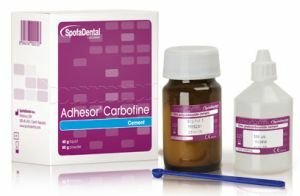 Adhesor( Adhesor) is a cement material used in dentistry. Adhesor Fine( Carbofine) - two-component cement mixtures supplied in the form of powder and liquid.
Adhesor( Adhesor) is a cement material used in dentistry. Adhesor Fine( Carbofine) - two-component cement mixtures supplied in the form of powder and liquid.
Dental cement does not irritate dental tissues and has natural adhesion. The drug is X-ray contrasted.
Contents
- Composition and form of
- Purpose of use
- Qualitative characteristics
- Instruction for use
- Cost and analogues
Composition and form of release
Adhesor Fine material includes a powder consisting of a zinc phosphate mixture and a mixing liquid. Packaging standard - a glass bottle with powder( 80 g.) And plastic - with a liquid( 55 g.), Also included a measuring spoon.
Adhesor Carbofine is a zinc-polycarboxylate cement and contains in the composition: 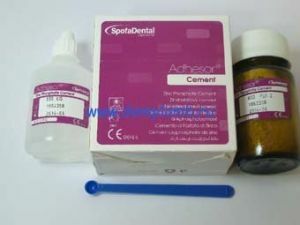
- a dry mixture of zinc, magnesium, aluminum and boron oxides( oxide Zn, Mg, Al and acid borici);
- is a liquid based on acrylic acid and maleic anhydride, with the addition of distilled water( containing aluminum phosphate and phosphoric acid).
Product: 1 glass jar with powder( 80 g.), 1 bottle with liquid( 40 g.).In the kit there is a measuring spoon.
Both preparations are manufactured by the Czech company - Spofa Dental.
Storage conditions: in a dry, dark place. Temperature is not higher than 25 C.
Purpose of use
Fain adherent is a modified form of cement based on zinc phosphate. It has a fine structure, which allows it to be applied very thinly. The material is suitable for:
- use as a lining for permanent seals made from different materials;
- cement fixation of non-removable dentures, crowns, bridges, tires, etc.(the ability to use a thin layer allows you to make an accurate fixation);
- manufacturing of temporary seals( with a period of use up to 6 months).
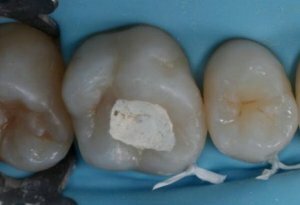 Purpose Adherent Carbofine - similar. The difference is that the previous material, due to its structure and composition, allows for more precise fixation during cementing. It can be used on large areas of tissue.
Purpose Adherent Carbofine - similar. The difference is that the previous material, due to its structure and composition, allows for more precise fixation during cementing. It can be used on large areas of tissue.
Adhesor Carbofine is used for the cementation of small permanent crowns. Its advantage in the possibility of use for overlapping in the case of the use of the preparation is Calcium. The material is used when the tooth cavity can not be dried, because the cement has a high degree of resistance to a moist environment.
These dental cements also use:
- as a lining when compositing composite seals;
- for fixing permanent crowns during dental prosthetics;
- for the manufacture of temporary seals for channel sealing;
- when sealing channels with gutta-percha pins.
Carbofine is also used as an insulating pad when tooth restoration is performed by composites.
Qualitative characteristics of
Adhesive( both types) has properties that give it some advantages among similar materials:
- high adhesion( adhesion ability) to the bone tissues of teeth, which allows permanent fixation of permanent fillings, prostheses and crowns;
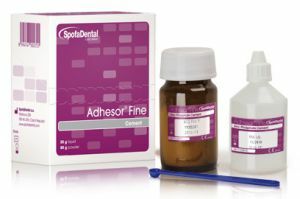
- the cement mixture does not irritate the pulp of the teeth;
- is an X-ray contrast material;
- is simple and easy to use;
- quickly hardens and has good strength;
- can adjust the working time and easily change the consistency of the mixture;
- is possible, due to the structure of cement, to create a very thin layer;
- creates a strong tight fit to the tissues of the teeth;
- has a low degree of deformation after hardening.
These properties make it possible to perform dental procedures qualitatively and provide a long-term result.
Instruction for use
To prepare the mixture, it is necessary to mix the constituent components. Their ratio and the rules of use depend on the type of work performed. When used as a lining material and for making temporary seals, it is necessary:
- to mix the mixture in a volume ratio( 3 scoops of powder to 5 drops of liquid);
- powder is gradually added to the solution;
- mix thoroughly for 1 to 2 minutes;
- mixture is prepared on a glass stand, using a special spatula;
- working time is about 2-3 minutes( at room temperature - 22 ° C), hardening time is up to 6 minutes, if it is necessary to increase the working period, you can reduce the air temperature by several degrees;
- after hardening it is possible to carry out final registration of a seal or a lining.
When mixing cement should be the optimum density. This is necessary to preserve the quality of the seal or gasket. Proper compliance with proportions makes the finished mixture homogeneous and shiny.
When carrying out fixation( cementing) the ratio of components is different. It makes 2 measurements of a dry mix on 5 drops of a liquid. Stirred to 2.5 minutes. Working time is up to 4 minutes from the beginning of the batch.
Cost and analogues
Cost of original cement Adhesor Fine ranges from 400 to 490 rubles, on Carbofine price tag is from 390 to 420 rubles. These materials are certified and recognized as high quality. 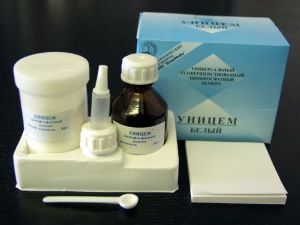
A lot of analogues are available, both domestic and foreign manufacturers:
- Unitsem - two-component cement produced in Russia( VladMiVa);
- Beladont - a means for cementing the frontal and lateral teeth;
- Clearfil - double hardening cement produced in Japan;
- Unifas-2 - zinc phosphate cement( Russia).
